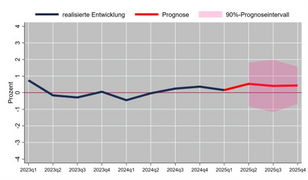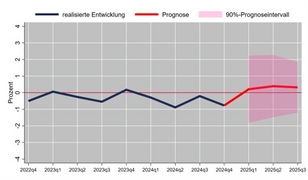Economic recovery - but with risks. The economic forecast for Baden-Württemberg for the 2nd quarter 2025.
The economy in Baden-Württemberg could return to moderate growth despite high geopolitical risks. For the second quarter, the latest nowcast from the Institute for Applied Economic Research (IAW) and from the University of Hohenheim predicts real growth in gross domestic product (GDP) of 0.5%. Positive growth of a similar magnitude is also forecast for the two subsequent quarters.


